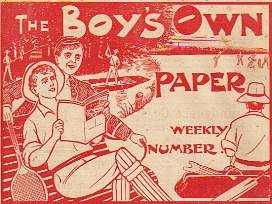| cb |
The Boy's Own Paper by
Jim Mackenzie (C)
2001 88 Years – Not a Bad Innings !
So, on January 18th, 1879, the first edition rolled off
the presses and went on sale. It really was a question of
the right person in the right place at the right time
with the right product.
The Right Time
The idea for B.O.P. was first raised in 1878 by the
Religious Tract Society who wanted to launch a weekly
paper for boys so that they could be steered clear of the
rash of "Penny Dreadfuls" that had sprung into
life after the famous 1870 Education Act that made
schooling compulsory for all. Boys in increasing numbers
were clamouring for something to read and B.O.P. was
intended to provide first-class stories for boys of all
backgrounds and ensure at the same time that they met an
underlying Christian morality during their formative
years.
The Right Person
The right person was, of course, the first editor, Andrew
Hutchison, who had already cut his teeth on a magazine
for the boys of Dr. Barnado's and on another with the
unlikely title of "Toilers of the Deep".
Hutchison was a man of great energy and a strong sense of
humour. Moreover he was reputed to have that knack of
being able to provide boys with not just what they
"ought" to have but also with he knew they
wanted to have. Strangely he claimed he had no skills as
a writer himself and that all he could do was edit. He
was fascinated by sport and science and he had that
invaluable instinct for finding and encouraging talented
young writers that is essential for the success of any
magazine venture.
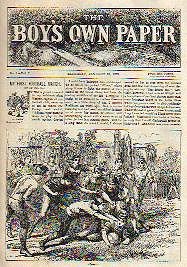
First issue |
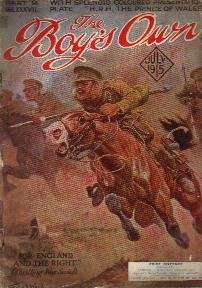
July, 1915 |
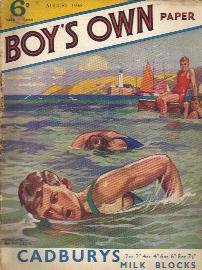
August, 1936 |
The Right Place and The Right
Product
In its earliest version B.O.P. was a weekly paper of 16
pages, in a buff-brown cover, and cost the princely sum
of 1 penny. Many copies of this first edition were in
fact given away in schools to ensure a good circulation.
Another tremendous factor in its immediate success was
the railway system of Great Britain and the one thousand
railway bookstalls of Mr. W.H. Smith. These railway
bookstalls became the central distributing agency for all
the towns and cities which they serviced. As the
reputation of Hutchison's little weekly grew it was
apparently not unusual to see a crowd of boys waiting for
the arrival of B.O.P. at the station on publication day.
Inside the Covers
Much of what was published in the early B.O.P.'s was not
unusual for its time. A young reader could expect to find
science, natural history, puzzles, school and adventure
stories, essay competitions, and personal reminiscences
– all delivered with a "healthy moral
tone" of course. However, either Hutchison was a
publishing genius or he had the most extraordinary stroke
of luck, for amongst the first scripts submitted for the
opening edition of his new magazine was a story entitled
"My First Football Match by an Old Boy".
Without hesitation he picked it to have pride of place on
the front page of the very first edition. The author was
Talbot Baines Reed, a remarkable man, and regarded by
many as the best writer ever of public school stories.
Yes, remarkable indeed, for Reed never ever attended
public school ! Very soon, however, he was the B.O.P.'s
first assistant editor and from 1880 to 1893 his stories
were all first serialised in the magazine before becoming
genuine best-sellers in book-form.
Famous Contributors
In the wake of this storytelling phenomenon came
other writers that still remain household names
– Jules Verne, R.M. Ballantyne, Henty,
Algernon Blackwood, and Sir Arthur Conan Doyle.
Typically, when he needed an article on cricket,
Hutchison succeeded in securing the services of
the great W.G.Grace. Amongst regular
correspondents in the columns of the B.O.P. in
its early days was Lord Baden-Powell, the founder
of the Scout Movement. Already, years before the
momentous 1908, he was urging boys to do a good
deed everyday and "to live clean, manly and
Christian lives". During the 1890's the
target audience of the B.O.P. appeared to shift
away from the poorer sections of society, and
useful advice to boys who worked in factories was
increasingly replaced by the interests of grammar
and public school boys. However, it should be
noted that the revenue from its sales continued
to support orphanages in Britain and charitable
activities in India, China and Africa. In its
contents sport and the sporting ethic grew even
more in importance and photographs of rugby teams
and of the competitors in the Oxford-Cambridge
Boat Race were regular features.
|
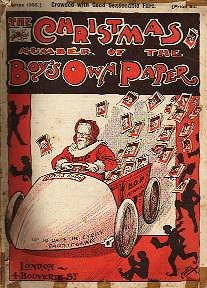
Christmas Number for 1906 |
From Weekly to Monthly
In September, 1912, Hutchison died, still working flat
out on the next weekly edition of B.O.P., and his place
was taken by Arthur Lincoln Haydon who edited the
magazine until 1924. The monthly schedule and the new
format of two columns instead of three were introduced in
1914 and remained in place for the remainder of its long
career. The price rose to 1 shilling and six pence by
1918 and the BOP braced itself for life after World War
1.
During the 1920's the magazine continued to thrive and
the third editor, Geoffrey Pocklington (from 1924 –
1933) secured the services of Major Charles Gilson, one
of the leading boys' fiction writers of the time. Mention
should also be made of the many talented artists that
have made invaluable contributions to the visual impact
of the B.O.P. since its early days. These include Stanley
L. Wood, R. Caton Woodville and the long-serving Alfred
Pearse who was a staff artist for over 50 years. In other
ways every attempt was made to keep up with the changing
times and articles would appear on subjects as diverse as
making radio sets, gun-laying, motor-cycling and winter
sports. It even managed to survive the industrial and
political problems thrown up by the General Strike. By
the time of the B.O.P's 50th birthday in 1929 its
continued fame was reflected by the attendance of Mr.
Stanley Baldwin, the Prime Minister, at the Jubilee
luncheon.
It Survived Hitler's Bombs
In 1941 the home of Boys' Own Paper was 4, Bouverie
Street, Fleet Street, London, E.C.4. Two incendiary
attacks during the great air raids on London completely
burned out the premises but, such was the spirit of the
whole team, that the famous magazine never failed to come
out. This is a Boy's Own Paper story in itself. For seven
years its headquarters moved to a country house in
Redhill Surrey and remained there until the original
headquarters was rebuilt.
It Grows Old
By the time of 75th anniversary, as recorded in the
March, 1954 edition, it was claiming to be going from
strength to strength. The then editor, Jack Cox, claimed,
"Its world readership has never been higher than
today, for B.O.P. is now read in 51 countries. (We had
letters from readers in 17 countries in one day in
October last.)"
The same spirit that inspired the founders is to be
found in a 1954 article by Stanley Matthews, the
celebrated England footballer, who recorded the following
incident :
"A small boy in one of our large industrial towns
once asked me, "What does it feel like to play for
England ?" I could see that he was puzzled and very,
very interested. "Do you play soccer, son ?" I
asked him. He nodded. "Then you know what it's like
to play for England. Every boy in England who does his
best to play a good clean, worth-while game is playing
for his country."
And dies
Sadly, just 13 years later, in 1967, the last volume
(number 89) went out for sale for the last time and Boys
Own Paper, to use another sporting metaphor, retreated to
the pavilion after a long and worthwhile innings. It was
gone but not forgotten. #
A Treasure
Trove From the Fifties by Jim Mackenzie
jmackenzie48@yahoo.com
The Last Flowering of Boys' Own Paper
A friend of mine recently unearthed a hidden
treasure in a small Northumberland bookshop. It was 44
copies of Boys' Own Paper from the period 1953 to 1957.
Both of us, alas, were far too young to remember these
magazines when they first came out and, by the 1960's,
the world of television appears to have absorbed the
youth of the nation. Magazines like BOP began to wither
and die. We who came later can only wonder at a world
that has disappeared. Indeed, it was like entering a
whole new territory when we began to glance at the covers
with their strange and somewhat naïve illustrations and
to turn tentatively through the pages and scan the tiny
print. Come with me now and let me see if I can take you
there – just for a while.
Tellers of Tales
Naturally we started with the stories. First
there was W.E.Johns and Biggles. At this discovery my
friend's palms began to itch. Biggles was big money and
collectors might pay a tidy sum to have the first
printing and the original illustrations that turned up
later in the volumes of short stories such as
"Biggles' Chinese Puzzle" and "Biggles Air
Detective". Regrettably this get-rich-quick scheme
had to be abandoned when we were reliably informed that
only the WEJ stories in magazines from the 1930's were
really valuable.
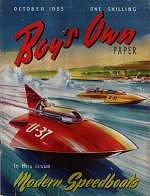
October, 1953 |
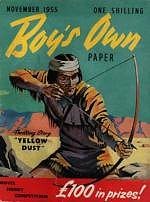
November, 1955 |
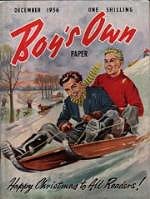
December, 1956 |
Still, Biggles, the leading boys' hero
of the century, was a sure sign of quality and we scanned
the other authors' names with some interest. Gosh –
there was Hammond Innes, who by the 1950's was already
making a name for himself as a writer of serious
adventure stories for adults. Eric Leyland, a prolific
author of the "Flame", "Red Lawson"
and "Steven Gale", adventures also made many
contributions. As well as short stories there were
serials, including "Jackals of the Sea" by
Arthur Catherall and "Majorca Moon" by Jack
Cox, the editor of BOP during this period. Lesser known
but extremely regular fiction contributors were John
Bancroft, C.T. Stoneham, Gerald Wyatt, and Geoffrey
Morgan. An issue selected at random, November 1956,
promises such delights as "Elephant Curse",
"The Orang-Utan Run (Part 3)", "The Fiery
Thunderbird", "The Incredible Captain
Grant" and "Feud in Soho" by Leonard
Gribble. Now, there is a name to conjure with. Leonard
Gribble, the compiler of many books of true crime
stories, had for many of these 1950's editions
contributed a little piece of fiction entitled
"Ten-Minute Mystery". The idea was that Gribble
would tell of the investigation of Superintendent Slade
of Scotland Yard for approximately 300 – 400 words.
There then would follow these enticing words:
"What was the vital clue Slade had found ? All the
necessary clues are given. Solution below."
Printed upside down in italics would be the answer. I
have to confess that in "The Case of the Coast
Patrol" (BOP April 1955) I cheated and discovered
that the murderer claimed to have walked along a beach
when the tide was in (I think !).
The formula for where the stories appeared in the
magazine varied very little and the usual three or four
started within the first 32 pages and then suffered from
the "Please turn to page 69" syndrome that
banished the conclusion, or, in the case of the serial,
the cliffhanger, until the last few pages, where it
rubbed shoulders with the Competition Results from two
months before. At times BOP would turn seasonal and you
would have stories involving old inns and highwaymen for
the December edition. Space stories (e.g. "Space
Saboteur" by William F. Temple) in particular,
appear to have divided the readership down the middle,
for the Readers' Letters section in the next few editions
would be full of angry comments about cheapening the
quality of the beloved publication. Special
anniversaries, such as the 75th birthday, would result in
an outbreak of reprints by authors as famous as Jules
Verne ("The Clipper of the Clouds") and Sir
Arthur Conan Doyle ("Uncle Jeremy's
Household").
English to the fore
Next to catch our attention were the regular
features which gave a valuable insight into what boys
needed to know in the 1950's. Certain names hit you again
and again. Ronald English was the cycling expert who
appeared every month without fail. He appeared to have an
inexhaustible supply of information at his fingertips
– all on the subject of bikes. First of all there
was the machine itself – "Overhauling a free
wheel", "Spring cleaning the hub", not to
mention the rather daunting "Adjusting the Handlebar
and Dismantling and Reassembling the Steering Head".
Next there were the exhilarating possibilities of
"Cycling in the Snow" and "Let's Go Pass
Storming" and the adventurous "Try these cycle
routes" and "Figure-of-eight tour". On the
one hand there was the dull predictability of "Your
Toolbag" and "Derailleur Gear
Maintenance", and on the other the enigmatic
surprises of "Cycle Whilst the World Sleeps"
and his best title of all, "No Bike, No Wife !"
However amusing this may seem to us now, the letters from
the readers all give many thanks to this expert who, as
well as exhorting safety on many occasions, certainly
also encouraged many young cyclists into exciting
two-wheeled ventures both home and abroad.
Stamp collecting is another hobby that this magazine
manages to invest with both intrigue and the exotic.
Again the names L.N. and M. Williams haunt the contents
list every edition. Were they father and son ? brothers ?
uncle and nephew ? or even, whisper it quietly –
husband and wife ? Not being interested in the subject I
must confess that I have not read any of the regular
columns. Again the titles are enough for me –
"Fun with New Zealand" and "Are Duplicates
Your Problem ?" might be reduced to the mundane if I
probed into the details. Later columns became more
predictable, with "Stamp of the month" being
used ad nauseam.
George Graham was another contributor in whose fate I
became interested. I finally decided to shuffle the 44
magazines into chronological order and began to notice
astronomical articles each headed "The Night Sky in
November" and so on through the months. By the time
I got to June 1955 I was beginning to get worried, for
Mr. Graham had begun to get to the end of the 12 months.
What would happen to him when his time was up ? Would he
ever write again ? My fears were justified – come
September 1955 and he disappeared. I almost felt a
personal sense of loss and it was with some relief that I
came across his resurrection in February, 1957 with
"Window to the Stars" and his follow-up the
next month "Mars is so close anything might happen
!" convinced me he was back into his stride. Phew !
Make leisure a pleasure
Although not quite as overwhelming as Ronald
English and his cycling advice, George L. Wakefield, the
photography expert, manages to give hundreds of valuable
hints about both looking after your camera and how to
take good snaps. Readers' competitions, with some rather
striking pictures of people and places, are enlivened by
friendly but firm comments about the boys' efforts. There
are also articles on assembling your own motor bikes and
building racing cars. Contrary to my expectations,
train-spotting did not get more than a perfunctory
mention. However, "Our Air Correspondent", who
was presumably different from "Air
Correspondent", was always cropping up with
"Let's Go to London Airport" or "Angled
Flight Deck" and the more alarming "Man from
Mars ?" and "Short Sherpa" (which was
about an aeroplane and not a diminutive mountaineer from
Tibet.)
A typical sporting contributor would be the well-known
BBC commentator of the fifties and sixties – Peter
West. (I can still remember his classic comment at the
end of an exciting Rugby Union international. "The
referee's got his watch in his hand. He's going to blow
on it !" ) In BOP his focus was on cricket and
rugby, with the occasional "Let's Try
Wrestling" or "Football is a grand life"
thrown in for good measure.
Every now and then there would be an attempt to be
controversial and a regular columnist called Reg Butler
would toss out questions for debate. Thus we have
"Are Amateurs Doomed ?" and "Is
Hero-Worship a Menace ?" and "Is Motor-Racing
worth the risk ?" Sport, however, was not the only
topic that invited this treatment and Mr. Butler also
offered "Are Hobbies more important that homework
?" and the ever-topical "Do Boys Need a Holiday
From Parents ?" I fear he over-stepped the mark when
he began to jump Ronald English's claim with "Should
Under 15's be Banned from Cycling ?" Of course the
idea was that BOP's readers would respond and the best
ideas and opinions would be published in later editions.
Either the editor rigorously sorted the wheat from the
chaff (and printed the chaff !) or the boys of 1950's
Commonwealth were remarkably tame and less fond of
retributive justice than the current specimens I have
met. The strongest suggestion made to "Is there a
cure for litter louts ?", for example, was that each
culprit should be made to pick up 1 pound in weight of
litter for each item they dropped.
On the straight and narrow
There is no doubt that BOP, even in the 1950's,
was still maintaining the high moral standards of the
founding fathers. Every now and then there is an article
or anecdote about how individuals, sometimes quite famous
ones, found fellowship and faith and a new path in life.
To modern eyes they might seem strange in style but they
still ring with sincerity. The general approach and the
vocabulary may at times be old-fashioned but the
contributors – both writers and readers – do
seem to share a set of common values. Typically, Jack Cox
writes a very clear editorial about the dangers of racism
– except in the language of the 1950's it was called
the "colour bar". His readers write in letters
to win cash prizes offered each month but I am struck by
just how often they add a line which says "If I am
lucky enough to win, please donate my prize to" and
here would follow a whole range of world-wide worthy
charities.
Of course, I have hardly begun to mention the
"infinite variety" that was offered by this
publication over the course of the middle years of this
decade. There are Herbert Harris' interviews with
show-business celebrities like Norman Wisdom, Gordon
Douglas' monthly crossword puzzles, John Bee's chess
problems and the celebrated "Gag Bag". This
latter is sometimes given an extra boost by having the
name of a comedian tagged on – "Bob Monkhouse's
Gag Bag" or "Max Bygrave's Gag Bag" and so
on. Political correctness had not been invented and so we
get gems such as,
"Dad, I do wish you'd let mum drive the car for a
bit." "Good heavens ! Why ?" "It's
much more exciting !"
Choose which you fancy – you can't go
wrong
There are still two more big ingredients left
that I must mention if I am to catch the full flavour of
the 1950's BOP. First of all there are the
advertisements. If you have tears, prepare to shed them
now. Nostalgia will grip you every time you open one of
these monthly classics. Britain's lost maritime heritage
stares out at you from every page. I had never realised
that there were so many colleges available that could
train you to be radio operators or coach you in
navigation or teach you the basic principles of
seamanship. From South Shields to Portsmouth, from
Bridlington to Southampton, recruitment into the Merchant
Navy was a big business. And no wonder Ronald English's
cycling articles form such a regular item on the diet of
articles for there are hundreds of bikes for sale –
and all of them British ! Eager boys and girls with
bright eyes and natty shorts ride happily into the sunset
with fixed grins or the satisfied smirk that goes with
ownership of a Hercules (The Finest Bicycle Built Today)
or the new Triumph (It has science behind it !)
On a more mundane level I still find myself tempted by
Terry's Steelstrand Chest Expander or the
"Rover" Hike Tent. To give me energy I can tuck
into Simpkins Vita Glucose or Palm Toffee, as advertised
by the inanely grinning Palm Family cartoons. You too
will find your fingers itching to fill in the coupons to
send off for Hurricane Protective Goggles, Typhoon
Surfmaster Swim Fins and the P.C. Mosquito Tent. You
could become a one-man army by purchasing a B.S.A. air
rifle or a Diana air pistol or take a course at the
National College of Rubber Technology or learn how to
build your own canoe. Better still, why not win a free
day at a test match by purchasing a Lambert cricket bat
and entering their competition (Decision of the judges is
final and binding.) ? Be sure you use Brylcreem (The
perfect hairdressing for men of all ages.) – just
like Dennis Compton.
Have any other readers had a similar
experience ?
Last, but not least, of the attractions of
reading BOP in the 1950's was regular monthly post-bag.
This was inter-activity at its best. A boy would write a
letter, other chaps would reply and sometimes the editor
might chip in with a tart or friendly comment. It really
was a tremendous lucky dip into a world where the deadly
dull jostled with the tongue-in-cheek and the plain
baffling. One boy writes in to list the nicknames he has
acquired during his time in secondary school whilst
another applauds the editor's recent article about
UNICEF. There is a running battle about whether space
stories are suitable and a constant clamour for new pen
friends. Here are three typical openings from letters in
the September, 1956 postbag.
"I am fond of bird-watching and my favourite haunt
is the Loughborough sewage farm."
"My hobby is the unusual one of heraldry."
"I have been playing a game of chess by post with a
friend…"
Of Girls and Hamsters
Lots of the juvenile correspondents are brimming
over with ideas for new items in the BOP – an
article about boomerangs, bell-ringing, how to make
fudge, and how to read a map. One of my favourite threads
concerns the difficulties involved in learning ball-room
dancing. This appears to start with a letter from Malvern
College
"We have everything we need for a first-class,
all-round education except for one item – ballroom
dancing. The college is surrounded by girls' schools, yet
we only see their occupants when they are on their daily
walk in orderly "crocodiles". How can a boy
possibly take courage and ask a girl for a dance when he
never even speaks to one for three quarters of a year
?"
One respondent to this plea reveals how he cunningly pays
for private lessons in his holidays. After that he has no
trouble with the fair sex. From the rest of the
correspondence we have so to say that he is the
exception. Witness this "cri de coeur" from
Robert Taylor of Whitley Bay,
"….worst of all they are daring to intrude on
the strictly masculine domain of BOP. Equality with men
is all very well but this is surely the last straw. I
personally have given up paying the courtesies that women
expect from men."
Another reader complains that he gets queer looks when he
offers to carry women's parcels for them, whilst Michael
Stagg of Tangier adds his own little dash of vitriol.
"In my experience of driving I have found that the
only thing you can be sure of when a lady sticks her hand
out of a car is that the window is open."
The Editor, Jack Cox, in the 75th anniversary edition,
took a light-hearted look back at some of the old letters
pages from the early editions and discovered that
"Take a cold tub, sir" was the answer given by
the famous Andrew Hutchison to every ailment or
difficulty or unsatisfied desire expressed by the boys of
those days. Let us end this trip into this foreign land
by Cox's own response to an enquiry about the opposite
sex.
"Most boys like to think they have a girl friend,
especially the 13 to 14 year olds. I would like to see an
article on how to get a girl, and when you've got her,
how to keep and please her. I would also like to see more
articles on music in B.O.P as I am a trombonist in the
Tiffin School Band." R. Wilmot (New Malden, Surrey)
Editor's Reply : "We will bear the suggestion for an
article on how to keep a girl friend in mind ! In the
meantime there is an article on keeping Golden Hamsters
on pages 34 and 35 of this issue."
You can now see why Britain was so well prepared for
the Swinging Sixties ! #
COMMENTS
Date: 28/09/09
Towards the end of the BOP's life in 1961 I lived in
Cardiff. I was a paper delivery boy and one Sunday during
that winter of deep deep snow, the mail train from London
(with all the Sunday papers on board) was very delayed.
Hanging about in the shop in the Pontcanna area of the
city with nothing to do, I picked up a BOP for the first
and only time, and discovered a 'Win a bicycle
competition' (value up to £25!) . It was a very simple
competition so I entered it and a few weeks later a
letter arrived...I (along with 3 other boys from all over
UK) had won! I remember travelling alone to the
'Cycle Show' at Olympia and being met at Paddington by
Jack Cox (I'm sure it was him) . At the show , after
lunch, I selected a golden "Viking Conquest"
with Durellia gear' my first new bike ever!!!!...it was
delivered 4 weeks laterIt was a wonderful prize!! I have
never forgotten how it felt!!.
Bob Etherington
Back to Collecting
Books & Magazines.
|
cb |
